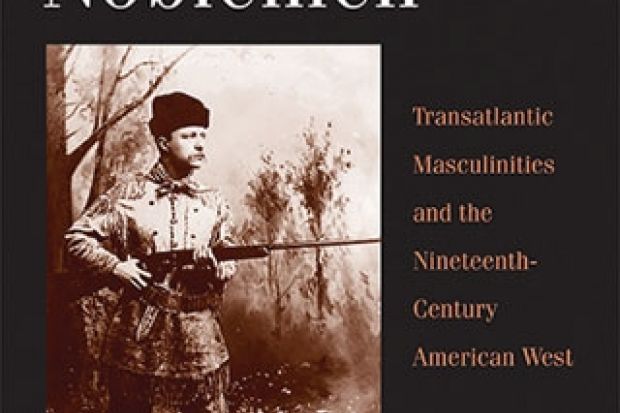The history of the American West (along with American studies as a whole) has recently taken a transnational turn, rejecting an earlier emphasis on US exceptionalism. So Monica Rico focuses on this Western history as it connects “with other imperial and colonial histories”, and looks beyond one continent to see (using the words of fellow historian David Wrobel) the American West “as a global West, as one developing frontier, one colonial enterprise, among many”. While this does not undermine any notion of Western frontier settlement as crucial to the understanding of US history, it foregrounds its wider significance.
Rico’s primary subject is the relationship between hegemonic masculinity, frontier space and race. “Frontier stories”, she argues convincingly, “offered a set of cultural tools that enabled upper-class men [specifically British and American] struggling to make sense of the rise of a new democratic, industrial society to create meaning in their lives.” She focuses mainly on six men and one woman. On the British side, she charts the relationship between the home lives and Western experiences of a handful of British travellers and sometime investors: Sir William Drummond Stewart, Moreton Frewen, the Earl of Dunraven and Isabella Bird. On the US side, she explores the lives of the Western legend William F. “Buffalo Bill” Cody, and of New Yorker/Western hunter and rancher Theodore Roosevelt. She pays particular attention - as her transnational agenda prompts - to Cody’s time in London with his Wild West show, and Roosevelt’s on safari in East Africa. She also explores the life of Roosevelt’s brother Elliott, to show how, despite their closeness and similar experiences, Elliott “failed to emulate his [Theodore’s] project of iron self-command”.
Thus the “project of modern masculinity” Rico explores is that performed by a community of elite hunters who circulated between the West, the cities of London and New York, the landed estates of Scotland and Ireland, and even East Africa. Hunting is a crucial activity here for, in places (American or African) coded by those who travelled there as romantic wilderness, and far distant from the cultural anxieties and instabilities of the 19th- and early 20th-century modern world, the (endangered) virility of these upper-class men could be confirmed. This occurred both in terms of the “masculine power” and homosocial companionship associated with the hunting - and ranching - experience, and in the fact that in such contexts those “social hierarchies” that were beginning to seem so fragile back home could be reasserted. There was, too, a strong racial component to such thinking, a shared whiteness between different kinds of men, whether British aristocrats or American frontiersmen, based on an unwavering belief in Anglo-Saxon superiority and manifest destiny. For Roosevelt in Africa, the danger of wild animals mirrored in the “savagery” of the native peoples “marked Africa as a wild place that would never attain civilisation without the intervention of whites”.
This is a well-written book full of fascinating detail, from Drummond Stewart shipping live bison and grizzly bear back to Murthly Castle, his Perthshire home, to the huge painting of Estes Park, Colorado by Albert Bierstadt hanging in Lord Dunraven’s manor in County Limerick. One might argue that Rico’s book has a limited cast of characters and that at times the diversity of both their chronologies and experiences cuts against the taut coherence of her project. But this is nonetheless a valuable book about transatlantic masculinity and the idea (and reality) of the 19th-century American West.
Nature’s Noblemen: Transatlantic Masculinities and the Nineteenth-Century American West
By Monica Rico
Yale University Press, 288pp, £.50
ISBN 9780300136067
Published 5 July 2013
Register to continue
Why register?
- Registration is free and only takes a moment
- Once registered, you can read 3 articles a month
- Sign up for our newsletter
Subscribe
Or subscribe for unlimited access to:
- Unlimited access to news, views, insights & reviews
- Digital editions
- Digital access to THE’s university and college rankings analysis
Already registered or a current subscriber?




